Marketing tools for small businesses have become the backbone of modern-day growth. In a market where customer attention is fragmented and competition is fierce, they’re the difference between staying relevant and falling behind.
For instance, if you’re building from your kitchen table, a family-run store serving your neighborhood, or a fast-growing startup trying to scale nationally, smart digital marketing tools help you level the playing field.
They let you launch campaigns, automate tasks, capture leads, and engage across multiple marketing channels, all without needing a large marketing team or agency budget.
However, with an overwhelming number of platforms on the market, choosing the best marketing tools for small businesses can feel like a maze. You might end up with all sorts of queries, such as:
- Which ones actually help you grow?
- Which fits your budget and team size?
- Which tool helps you scale as you grow?
In this guide, we’ll discuss the must-have tools for email marketing, SEO, content creation, automation, social media, and analytics.
We’ll also discuss how all-in-one platforms like Birdeye are simplifying marketing for small business owners, helping them get discovered, earn trust, and grow sustainably in 2026.
Table of contents
- Why the right digital marketing tools are key to small business growth
- Best email marketing tools for small businesses in 2026
- Best CRM tools that turn customer data into business growth
- Best social media marketing tools that do more than schedule posts
- Best content marketing and SEO tools to boost visibility and authority
- Marketing automation tools to streamline workflows and unlock growth
- 2025 milestones that make Birdeye the #1 choice for growing businesses
- How Birdeye helped CF Search Marketing boost visibility
- How to choose the right digital marketing tools for your small business
- FAQs about marketing tools for small businesses
- Final thoughts: Choose marketing tools that work smarter together
Why the right digital marketing tools are key to small business growth
Running a small business today means competing in a world where attention is scarce, customer expectations are sky-high, and speed matters more than ever. Intuition and word-of-mouth alone can’t fuel growth anymore.
You need precision, agility, and the ability to scale without a large marketing team or agency budget. That’s exactly what digital marketing tools for small businesses deliver.
These online marketing tools don’t just make your life easier; they give you an edge in a crowded market.
Here’s how they power growth, simplify operations, and create room for smarter decisions:
- Understand your target audience better than ever: Marketing success starts with knowing who you’re speaking to. Digital tools provide deep insights into your customer behavior, preferences, and buying patterns so you can create campaigns that actually resonate.
- Launch and manage campaigns in record time: Whether you’re planning an email series, a Facebook ad, or a seasonal promo, today’s right digital marketing tools make it possible to plan, build, and publish campaigns across all your marketing channels in just a few clicks. It’s like having an entire marketing department at your fingertips.
- Create content that drives real results: Tools like Canva, Jasper, and Birdeye Social AI allow you to design graphics, write captions, and schedule posts with ease. Instead of spending hours on a single piece of content, you can produce and publish high-performing materials in minutes.
- Track every metric that matters: No more flying blind. Tools like Google Analytics and Birdeye Insights AI help you monitor your marketing performance in real-time. You’ll know what’s working, what’s not, and where to double down.
- Automate the tasks that slow you down: From email marketing campaigns and follow-ups to review requests and social media scheduling, automation tools handle your repetitive tasks so you can focus on growth. These aren’t shortcuts; they’re smart systems that run while you sleep.
- Save time, cut costs, and reduce overwhelm: Most small business owners juggle operations, sales, support, and marketing all at once. With the right tools, you can do more in less time without hiring extra hands or burning out.
- Leverage ready-to-use assets and workflows: Many tools now offer free versions, pre-built templates, drag-and-drop editors, and plug-and-play automation. Even if you’re not tech-savvy, you can still run professional, polished campaigns with minimal effort.
Now, let’s dive into the essential digital marketing tools every small business should know and how they help you work smarter at every step.
Best email marketing tools for small businesses in 2026
From onboarding new customers to nurturing leads and driving repeat purchases, email marketing lets you stay personal, timely, and cost-effective.
But in a world where inboxes are more crowded than ever, sending just any message won’t help it. You need precision, automation, and the ability to scale without complexity.
The following email marketing platforms stand out for their intuitive design, advanced features, and ability to support impactful email marketing campaigns at every stage of the customer journey.
Mailchimp
A well-known name among small business owners, Mailchimp is a great starter tool.
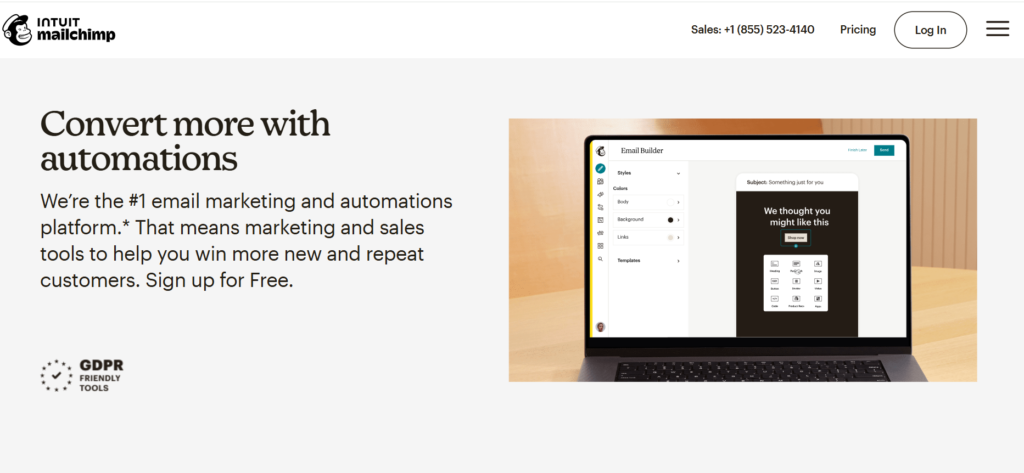
- Pros: It has a clean, beginner-friendly interface with a drag-and-drop design. It offers strong segmentation and pre-built templates, which are great for quick campaign setup and testing.
- Cons: The free version is limited, and as your list grows, pricing increases significantly. Advanced automation and reporting are only available in paid tiers.
Mailchimp integrates well with your social media and basic analytics tools, making it ideal for early-stage lead generation and startups testing the waters.
ActiveCampaign
It is a robust solution for those ready to scale beyond the basics.

- Pros: Known for its deep automation capabilities and built-in CRM. You can segment target audiences with precision and trigger hyper-personalized email marketing campaigns based on user behavior.
- Cons: Slight learning curve for beginners; setup takes time, but pays off for long-term scalability.
This is a powerful choice for growing businesses and marketing professionals who manage multiple campaigns across email, social media, and web funnels. The platform doubles as a marketing platform and CRM system.
ConvertKit aka Kit
Popular among creators, coaches, and digital sellers, ConvertKit, now known as Kit, strikes a balance between ease and customization.
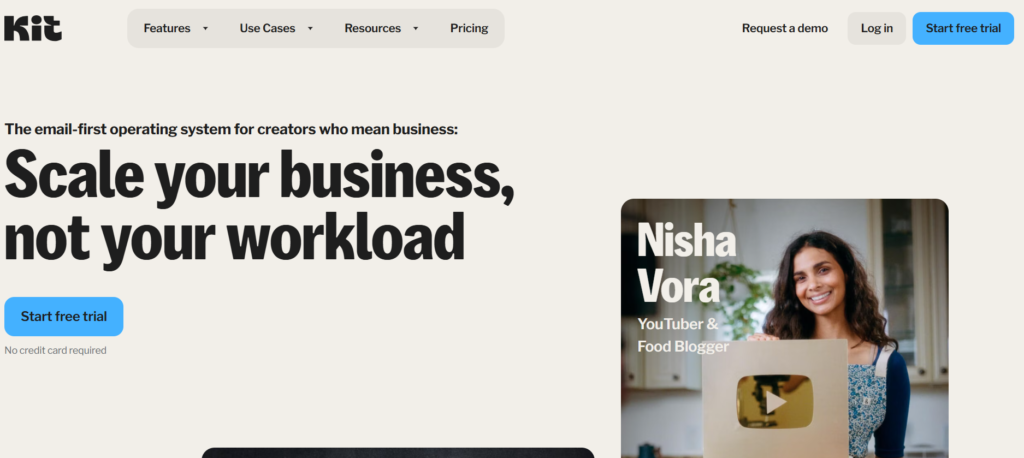
- Pros: Simple visual automation builder, customizable forms, and flexible tagging system for targeting subscribers. Excellent for nurturing and selling through email.
- Cons: It doesn’t offer complex CRM features, which may limit B2B businesses with longer sales cycles.
Suppose your business relies on educational content, product launches, or community-building. In that case, Kit offers the clarity and flexibility you need, especially when paired with a social media management tool to support multichannel visibility.
Constant Contact
Built for small business simplicity, Constant Contact offers the basics with stellar support.
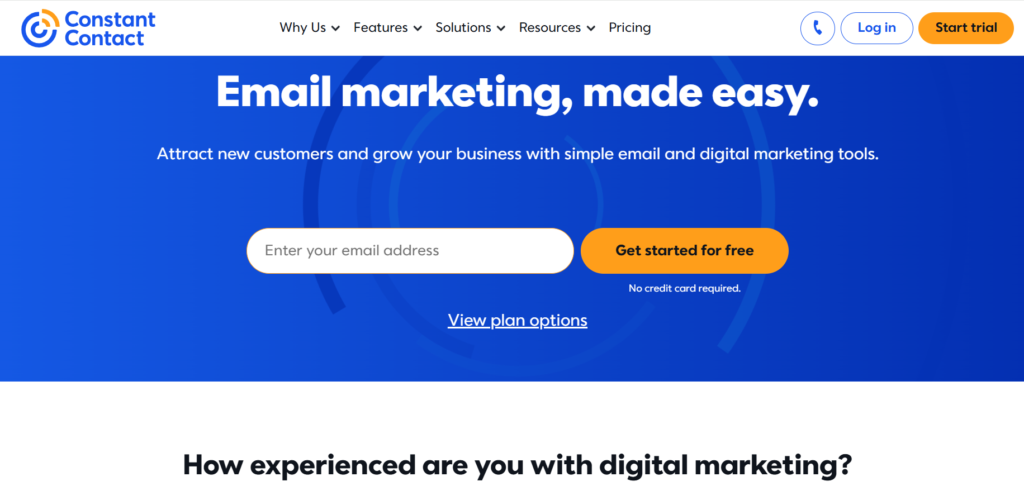
- Pros: It is easy to set up, with strong deliverability and an impressive library of email templates. Excellent live support makes it a reliable choice for less tech-savvy users.
- Cons: Less innovative than competitors; lacks cutting-edge automation and analytics depth.
It’s best for businesses that need reliable newsletters and event promotions, especially when integrating email into social media events or lead-generation campaigns.
Birdeye (Bonus Pick)
Birdeye offers more than being an email marketing tool. It is an all-in-one marketing platform that empowers small businesses to engage, convert, and grow across channels.
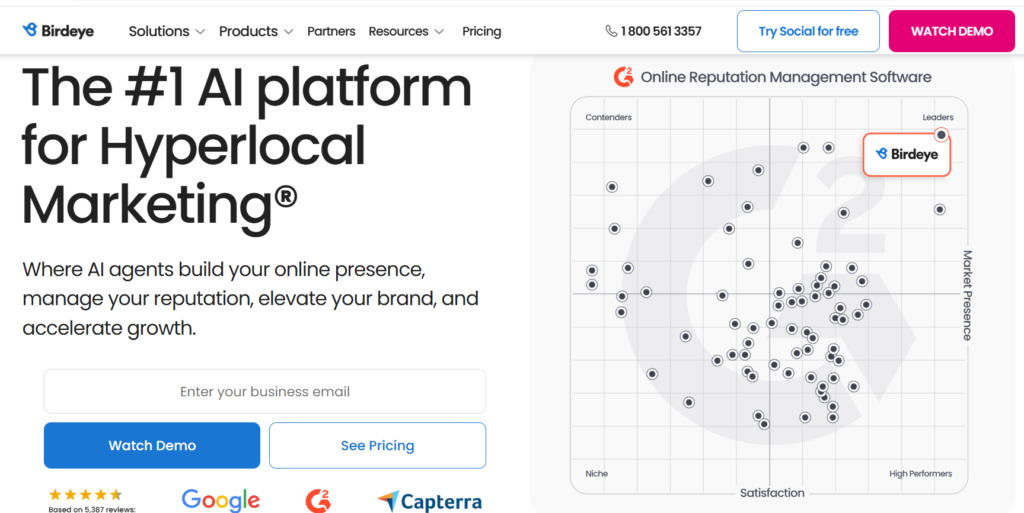
- What makes it different? Birdeye seamlessly blends email marketing automation with AI-powered review requests, surveys, and personalized follow-ups. You can launch email marketing campaigns that do more than inform; they drive action.
- Integrated Insights: Birdeye’s analytics tools provide real-time customer feedback on opens, clicks, and conversions, helping you refine your outreach.
- Cross-channel sync: From email to social media, your communication stays aligned, streamlining engagement and reducing manual work.
For small businesses looking to integrate email, reviews, and social media into one efficient workflow, Birdeye offers unmatched simplicity and value.
In a nutshell, these email marketing tools for small businesses are designed to build relationships, track performance, and deliver the right message at the right time.
Choose a platform that doesn’t just send emails but supports your entire lead generation and growth strategy from day one.
Now, let’s learn about CRM online marketing tools.
Best CRM tools that turn customer data into business growth
Today’s leading CRM marketing tools for small businesses are designed to simplify complex workflows and automate your follow-up process so you never lose track of a potential customer.
Whether you’re nurturing leads, managing service tickets, or launching personalized marketing campaigns, the right platform makes it all seamless.
Let’s explore some of the most powerful CRM platforms tailored for small businesses in 2026:
HubSpot CRM
A popular choice among startups and established SMBs alike, HubSpot offers a generous free plan packed with features.
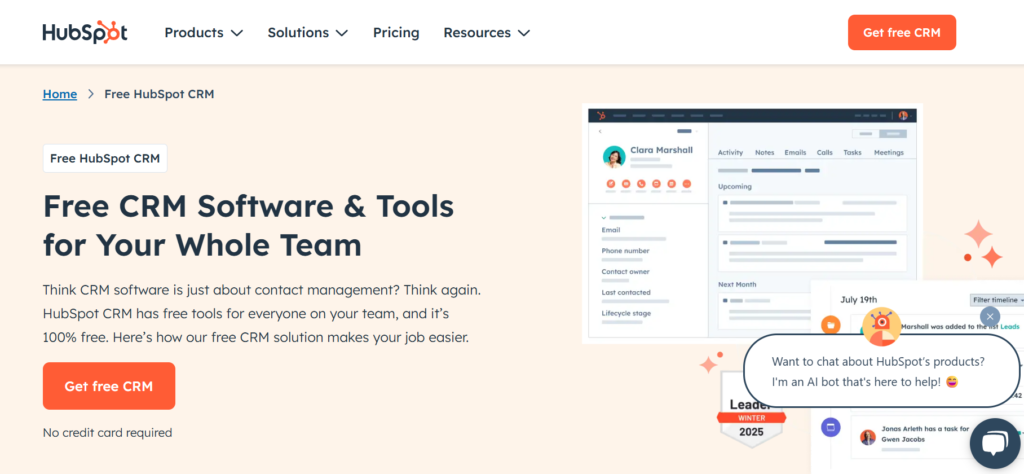
- Pros: Includes contact management, sales pipeline, email tracking, and robust integrations, all at zero cost to start.
- Cons: More advanced tools like workflows, predictive lead scoring, and advanced reporting are locked behind expensive paid plans.
HubSpot is great for businesses looking to integrate their email marketing software and sales functions under one umbrella.
Birdeye CRM Capabilities
Birdeye goes beyond traditional CRMs by combining contact management with powerful tools that drive revenue across the entire customer journey.
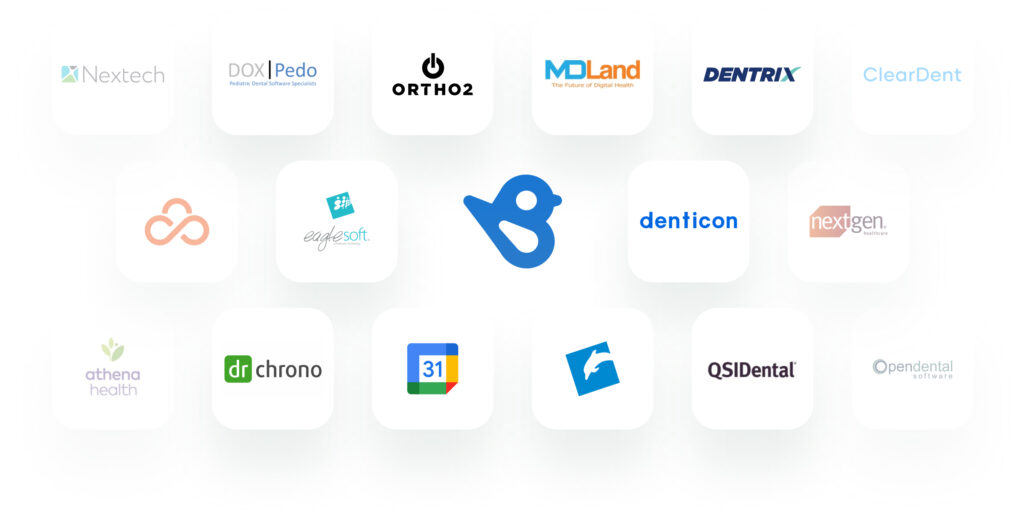
- Automate review requests and referral campaigns after every customer interaction.
- Centralize messages from email, webchat, text, and social media accounts into a single unified inbox.
- Seamlessly integrate with email marketing software, SEO tools, and social channels.
- Gain actionable insights through analytics tools that show what’s working and where to optimize.
Zoho CRM
Designed with affordability and flexibility in mind, Zoho CRM is ideal for businesses that need mobility and customization.
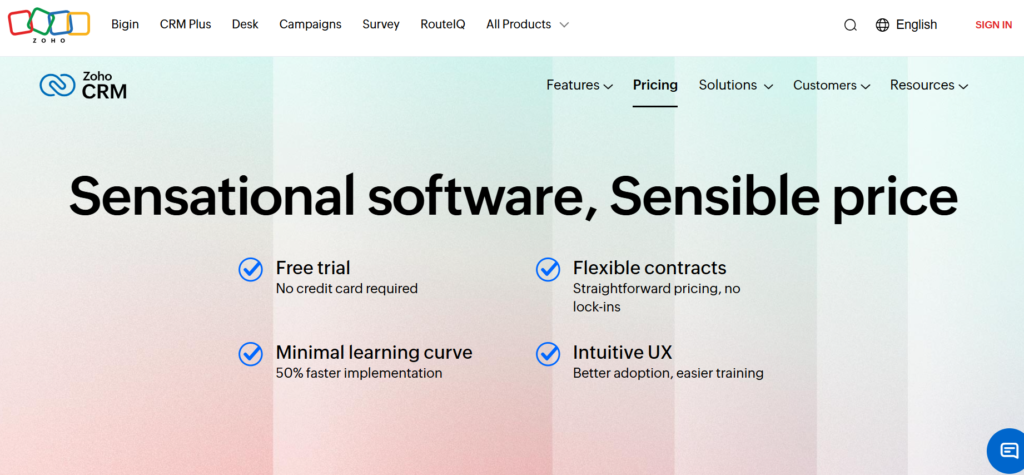
- Pros: Comprehensive features, mobile-first interface, and customizable modules. It offers AI assistance and workflow automation even for mid-tier plans.
- Cons: The Interface can feel overwhelming, and setup requires time, especially for first-time CRM users.
Perfect for growing companies managing active marketing campaigns across teams or locations.
Less Annoying CRM
True to its name, this CRM prioritizes simplicity and usability over feature overload.
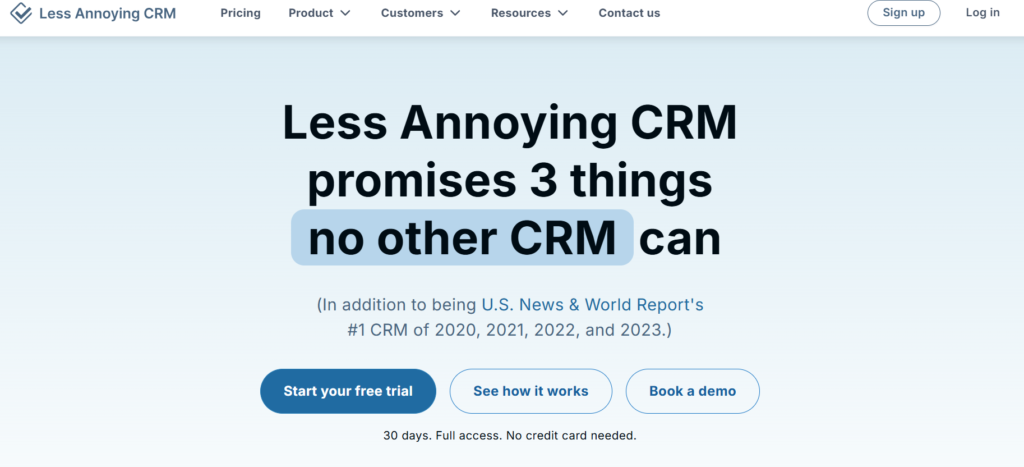
- Pros: Extremely easy to use, affordable monthly pricing, and no hidden fees.
- Cons: Lacks advanced automation or integrations, making it less ideal for scaling operations or complex marketing automation strategies for small businesses.
A great entry-level option for solo entrepreneurs and very small teams.
OnePageCRM
This tool focuses on turning contacts into actionable steps with its task-oriented design.
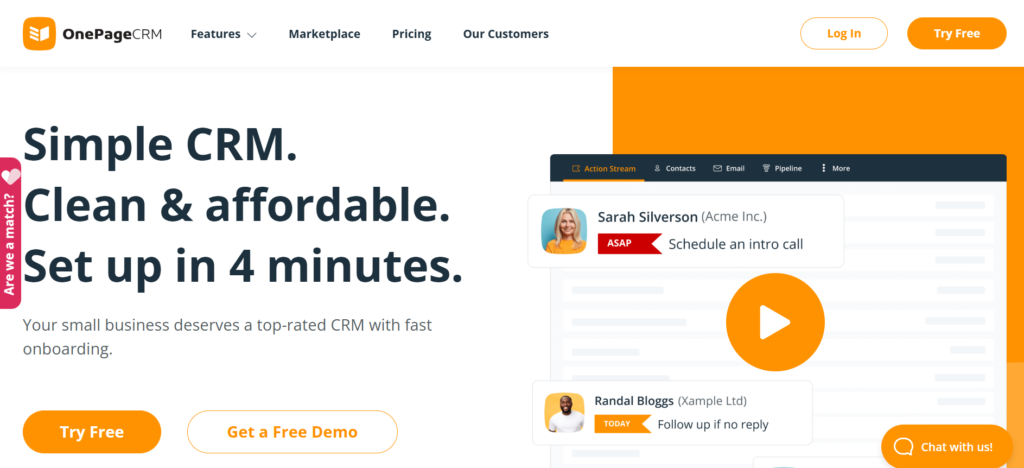
- Pros: Streamlines daily sales tasks; perfect for businesses that thrive on one-on-one follow-ups.
- Cons: Not ideal for large databases or multistep campaigns due to limited customization.
Works best for businesses in service industries or consultative sales roles with short sales cycles.
Best social media marketing tools that do more than schedule posts
Social media marketing platforms help you simplify content planning, automate distribution, track engagement, and drive performance across every touchpoint of your digital marketing plan.
Let’s break down the best tools to help small businesses manage and grow their social media accounts efficiently.
Birdeye Social AI
Built specifically for small businesses, Birdeye Social AI is more than a scheduler; it’s an accurate content and engagement engine.
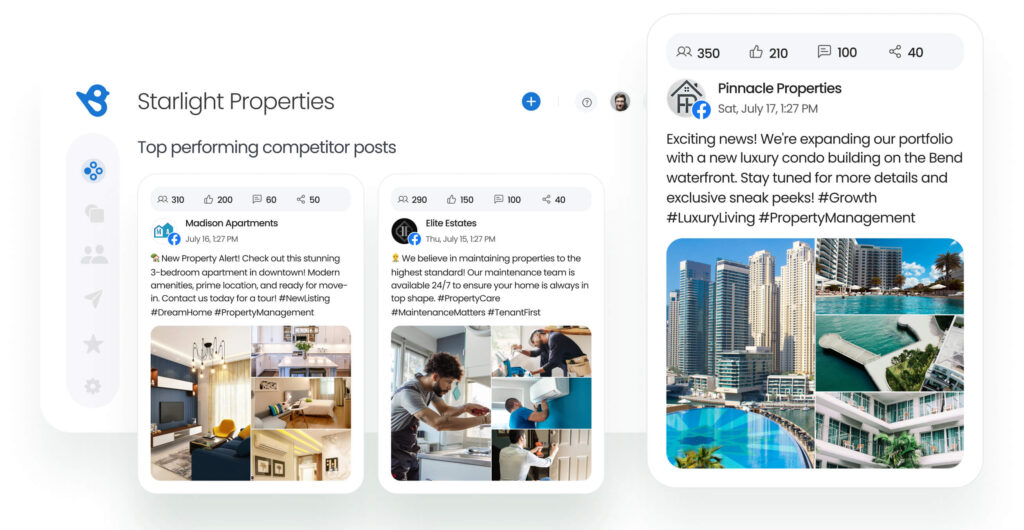
- Unified Inbox: Connects all your customer interactions from social, email, and webchat in one view.
- AI-powered content suggestions: Automatically generate post ideas tailored to your audience and industry.
- Multi-channel scheduling: Publish posts across Facebook, Instagram, and Google Business Profile from one dashboard.
- Smart automation: Sync your posts with other marketing automation efforts like email drips or review requests.
And because Birdeye links your social tools with your email marketing software and search engine optimization (SEO) tools, your entire marketing strategy stays aligned, saving time and driving better results.
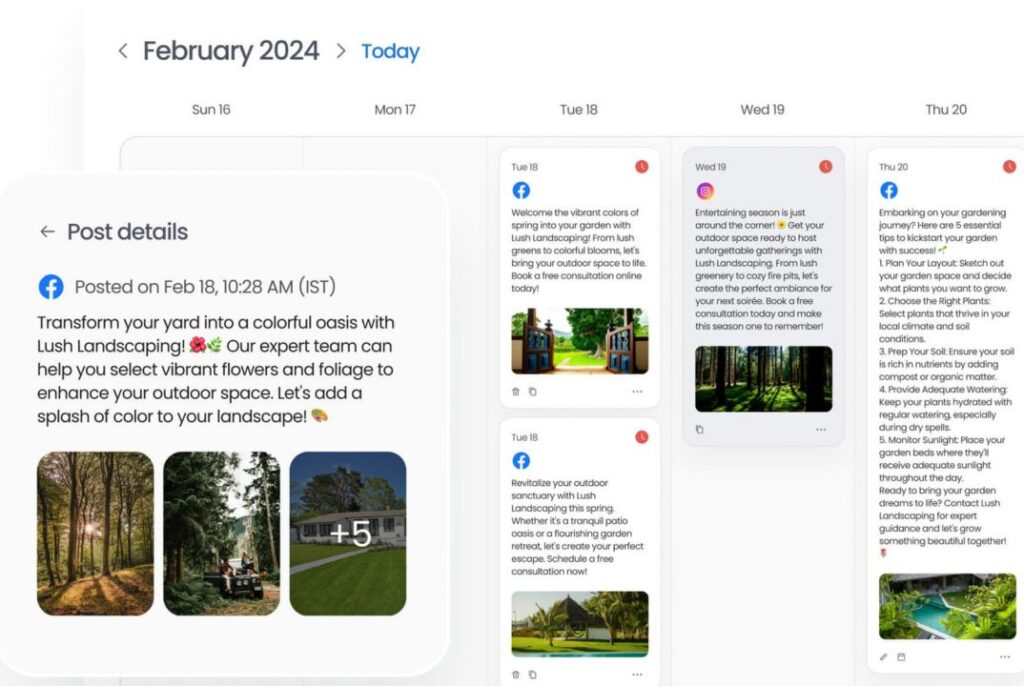
For businesses managing multiple profiles or locations, Birdeye’s ability to manage multiple accounts with consistent messaging is a significant asset.
Buffer
Lightweight, intuitive, and affordable, Buffer is an excellent choice for early-stage businesses or solo marketers.
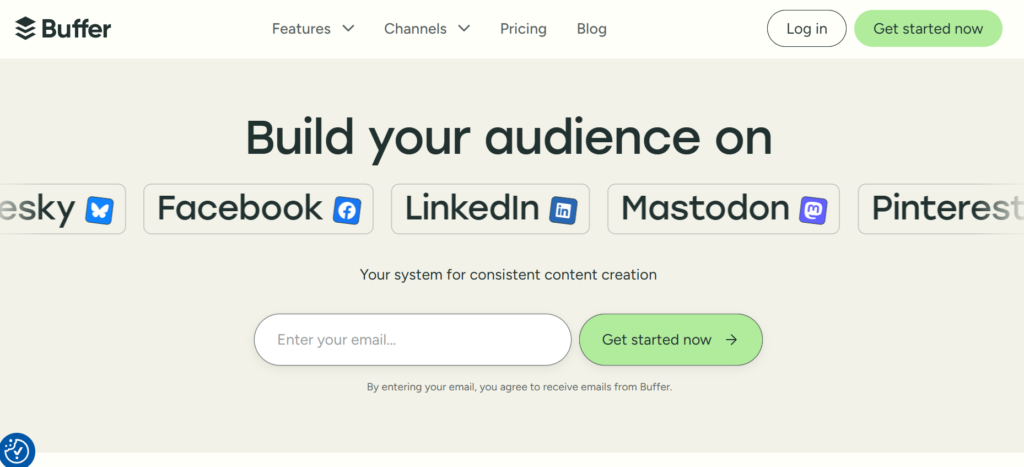
- Pros: Easy scheduling across platforms like Facebook, Instagram, and LinkedIn; clean UI; helpful browser extensions.
- Cons: Limited analytics unless you’re on a higher-tier paid plan; lacks deeper audience segmentation tools.
Buffer is great for consistent posting and basic engagement, especially when paired with beginner email marketing software for holistic reach.
Hootsuite
One of the most recognized names in social media management, Hootsuite is built for breadth and scale.
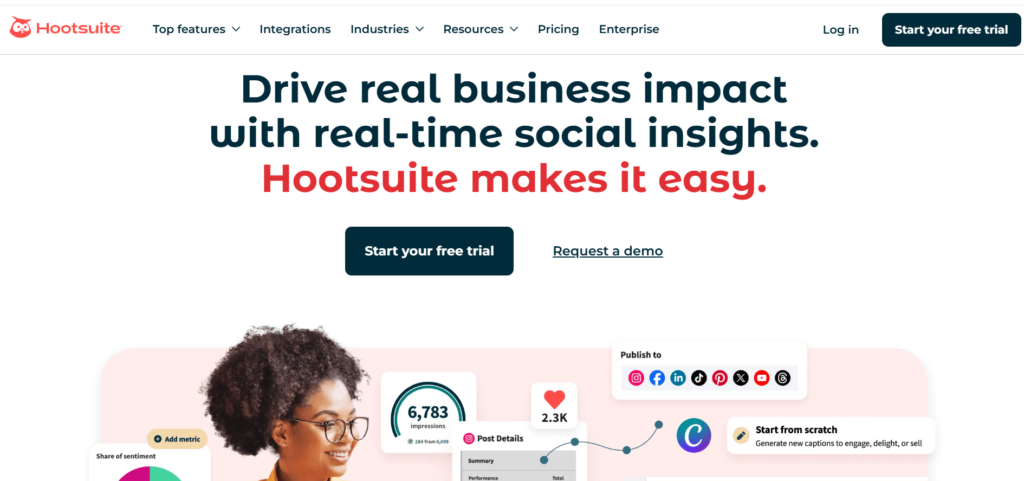
- Pros: Manage dozens of social media accounts; track competitor mentions, hashtags, and sentiment; robust team features.
- Cons: Steeper learning curve and higher pricing; UI can feel dated with so many modules.
Best suited for growing teams or marketing agencies running multi-brand marketing campaigns.
Sprout Social
For businesses that care deeply about performance and analytics, Sprout Social delivers clarity and strategic depth.
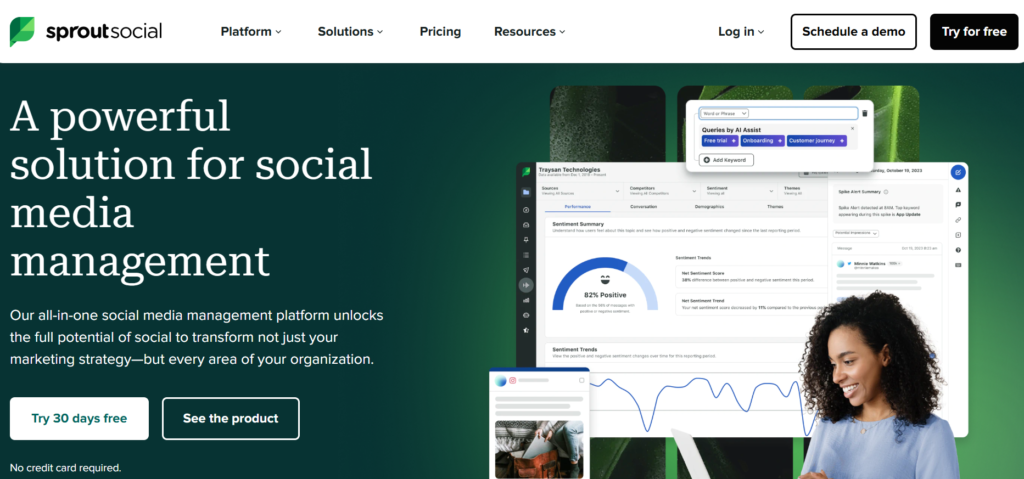
- Pros: Industry-leading reporting dashboards, listening tools, audience insights, and stellar customer support.
- Cons: Premium pricing may deter smaller teams; key advanced tools are available only on higher plans.
Sprout Social is a powerful fit for businesses looking to optimize marketing performance across multiple customer touchpoints.
These tools help to give you the structure, automation, and insights needed to run smarter marketing campaigns that truly connect. Choose a platform that grows with you because your audience isn’t just scrolling anymore. They’re deciding. And your content is their first impression.
While social media tools help you engage and grow your audience in real-time, the next step is building long-term visibility through powerful content and search strategies.
Let’s explore the best content marketing and SEO tools that drive discoverability and lasting impact.
Best content marketing and SEO tools to boost visibility and authority
For small businesses aiming to attract, educate, and convert, investing in the right content marketing and SEO tools is essential.
These tools help you create strategic, search-optimized, audience-relevant content that fuels discoverability and long-term growth.
The following search engine optimization (SEO) tools and content optimization platforms are built to help you plan, create, publish, and analyze content that performs across your marketing funnel.
Birdeye SEO & Listings AI
Where traditional SEO tools focus on content and keywords, Birdeye’s SEO & Birdeye Listings AI boosts visibility by ensuring your business listings are accurate, consistent, and optimized across 50+ platforms, including Google, Yelp, Facebook, Bing, and niche directories.
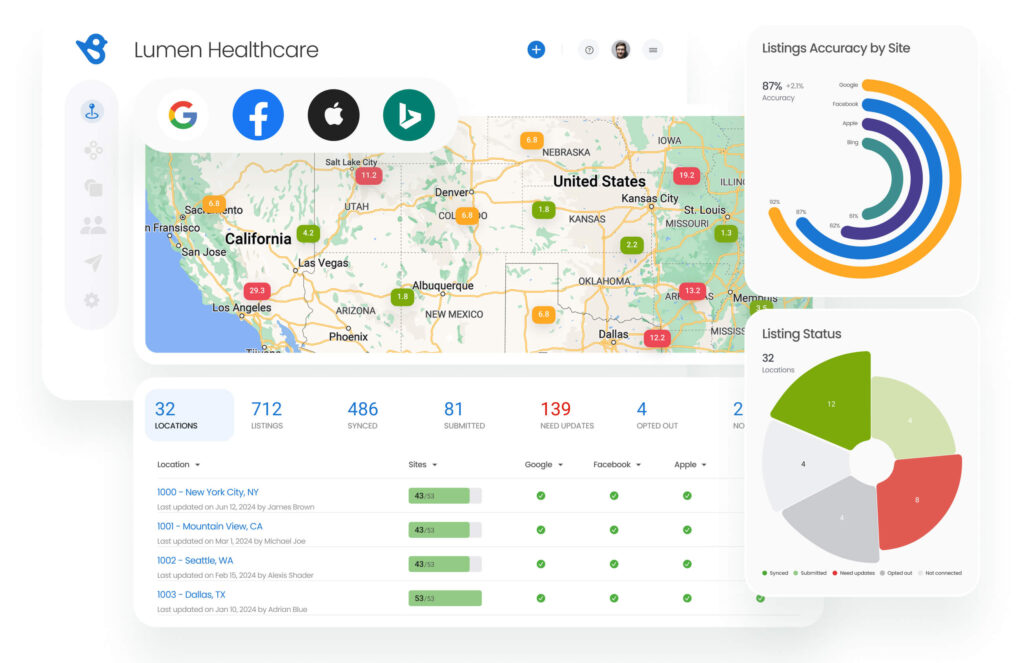
- Pros: Auto-syncs business information, eliminates duplicate listings and improves your local SEO ranking. Integrates with review generation tools to boost reputation-driven visibility.
- AI advantage: Combines listing accuracy with review insights to optimize how you’re perceived and ranked in local search results.
According to Birdeye’s 2025 State of Online Reviews, just one new review can lead to up to 600 additional Google searches for your business.
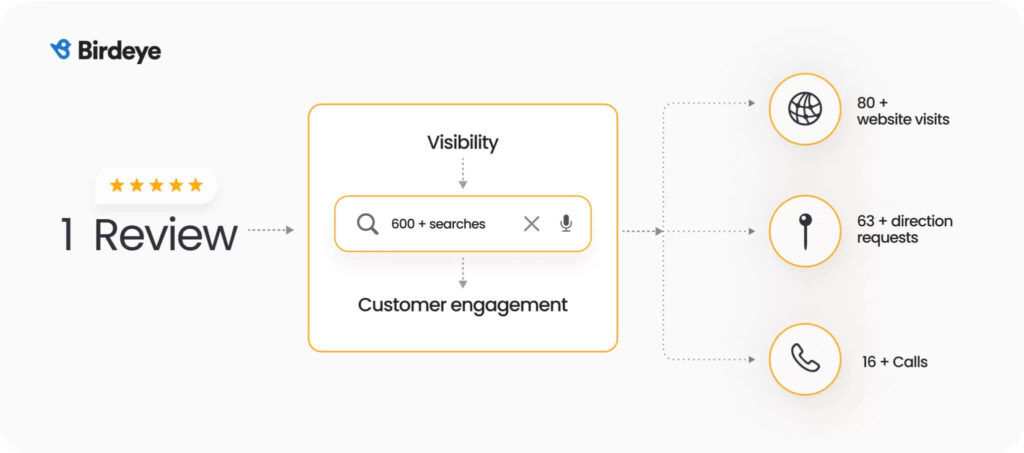
Birdeye bridges the gap between reputation, SEO, and content by ensuring your brand shows up where it matters and is backed by credible, high-quality feedback.
Semrush
A powerhouse in SEO, Semrush offers a full suite of tools for content marketing, keyword research, backlink tracking, and paid ad performance.
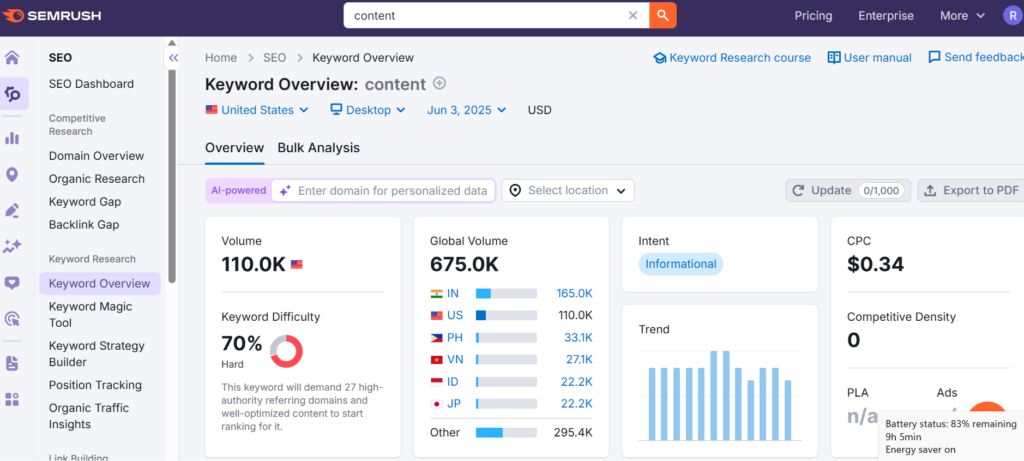
- Pros: All-in-one platform for SEO, PPC, content audits, and competitive intelligence. Its keyword and topic research tools are top-tier.
- Cons: Its comprehensive feature set comes with a hefty price tag, which can be limiting for solo entrepreneurs or early-stage businesses.
Semrush is ideal for small businesses that want to build a data-driven marketing strategy from day one, backed by analytics, not assumptions.
Clearscope
Clearscope is a content brief and optimization tool trusted by brands and content teams aiming to dominate organic search.
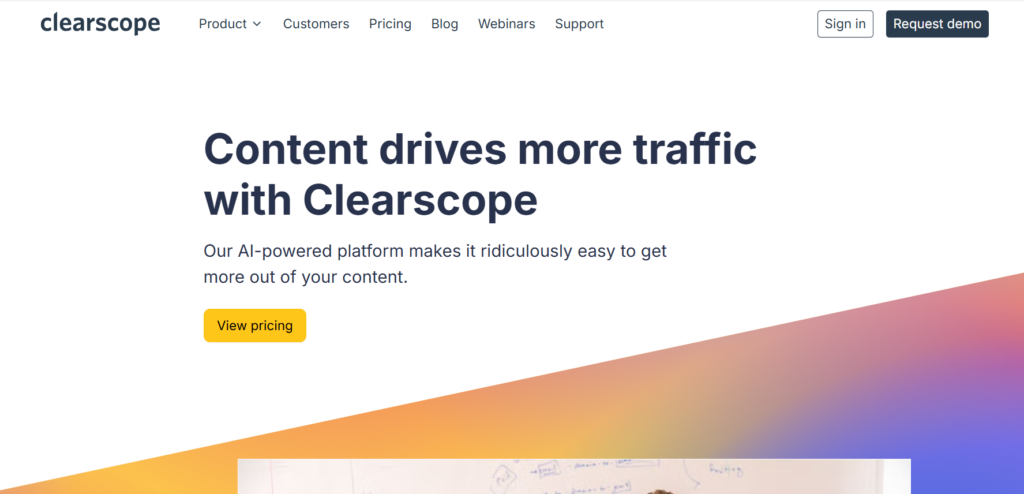
- Pros: Real-time content grading, competitor comparisons, and topic modeling make it a favorite for editorial teams focused on quality and structure.
- Cons: Expensive monthly pricing and limited keyword research capabilities compared to broader tools.
Best for businesses that publish long-form content regularly and want to refine existing assets for better SEO impact.
Surfer
Surfer makes on-page SEO accessible to everyone without needing deep technical knowledge.
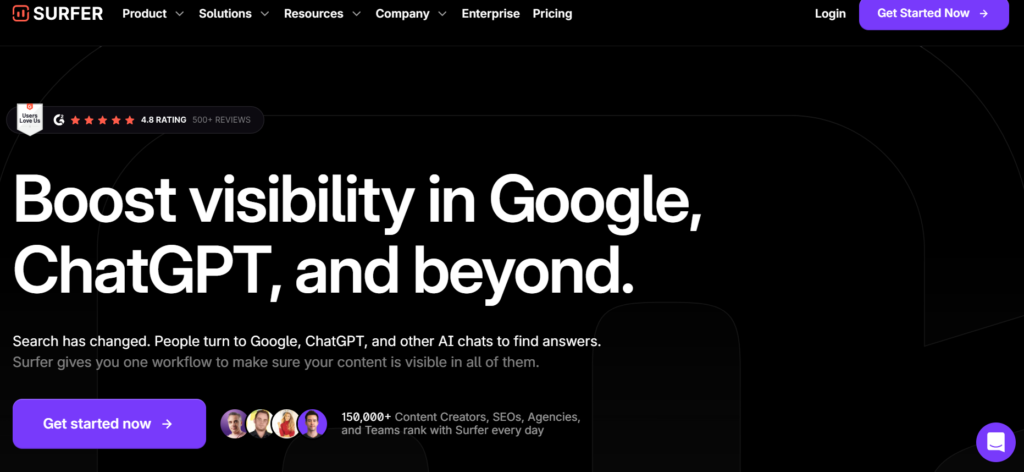
- Pros: Its affordable pricing, intuitive interface, and actionable recommendations make it a favorite among freelancers and content marketers. It also has great integration with Google Docs.
- Cons: It lacks deeper backlinks and technical SEO features in tools like Ahrefs or Semrush.
It is a great fit for businesses focused on scaling content through blog posts, landing pages, and product pages.
Canva
Great content doesn’t just read well; it has to look good, too. Canva makes it easy to design social graphics, infographics, PDFs, email banners, and more, even with zero design experience.
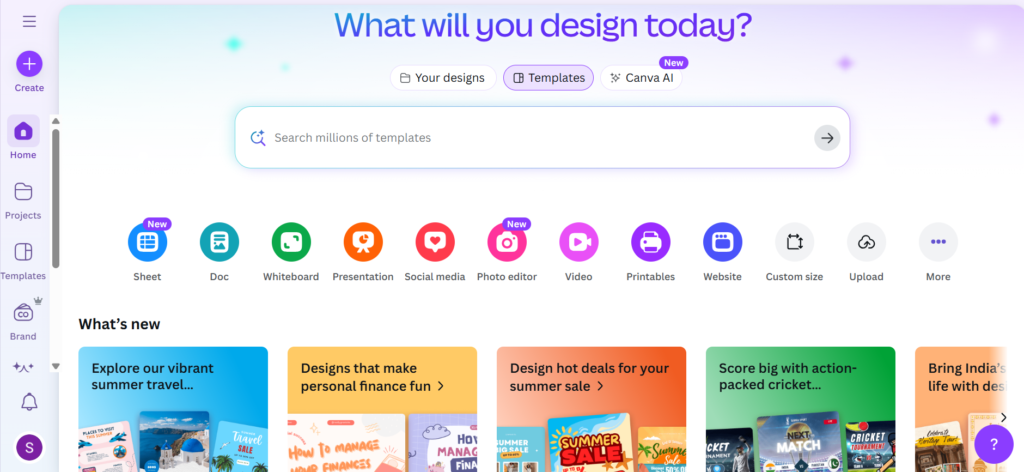
- Pros: Offers drag-and-drop simplicity, professional-looking customizable templates, and team collaboration features.
- Cons: Limited features when used offline; advanced design control is still better on platforms like Adobe.
For small businesses without a design team, Canva is the go-to visual toolkit to amplify their content across all marketing channels, from social to email.
Google Trends + Google Analytics
Two of Google’s most valuable (and free) tools- Google Trends and Google Analytics, are for understanding what people care about and how they interact with your content.
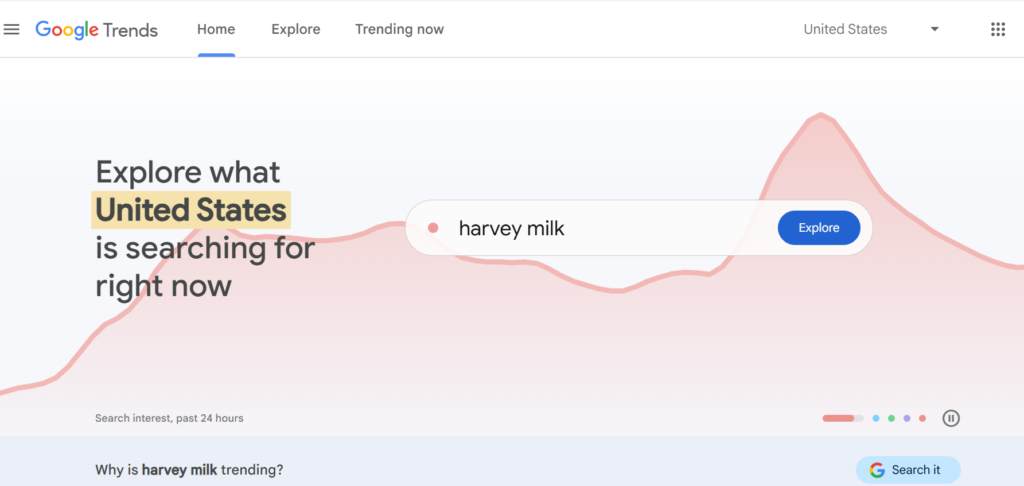
- Pros: Completely free to use, real-time data insights, and a vital part of any analytics tools stack. Together, they help you make smarter decisions about what to write, when to publish, and how to optimize performance.
- Cons: Requires some learning to extract actionable insights; not tailored specifically for content ideation or creation.
These content marketing tools are foundational to every digital marketing plan and should be used with other SEO and content platforms to shape smarter marketing campaigns.
In 2026, all you need is small business marketing tools that help you strategize, optimize, and amplify that content across the web. It lightens the burden of everyday marketing tasks, from publishing blogs and creating landing pages to boosting your social presence.
Power your growth with smarter marketing.
Want to see the impact of Birdeye on your business? Watch the Free Demo Now.
Marketing automation tools to streamline workflows and unlock growth
Marketing automation tools take the weight off your shoulders by streamlining the repetitive tasks that eat up your day like
- Sending follow-up emails
- Requesting reviews
- Scheduling social media posts
- Responding to customer inquiries
Automation goes beyond saving time, it brings consistency to your marketing campaigns, delivers timely customer interactions, and frees you up to focus on strategy instead of getting stuck in day-to-day execution. From AI tools writing assistants to full-suite automation platforms, here are the best tools to helping small businesses work smarter.
Jasper
An AI-powered content generation tool that helps businesses scale their marketing efforts with fast, on-brand copy.
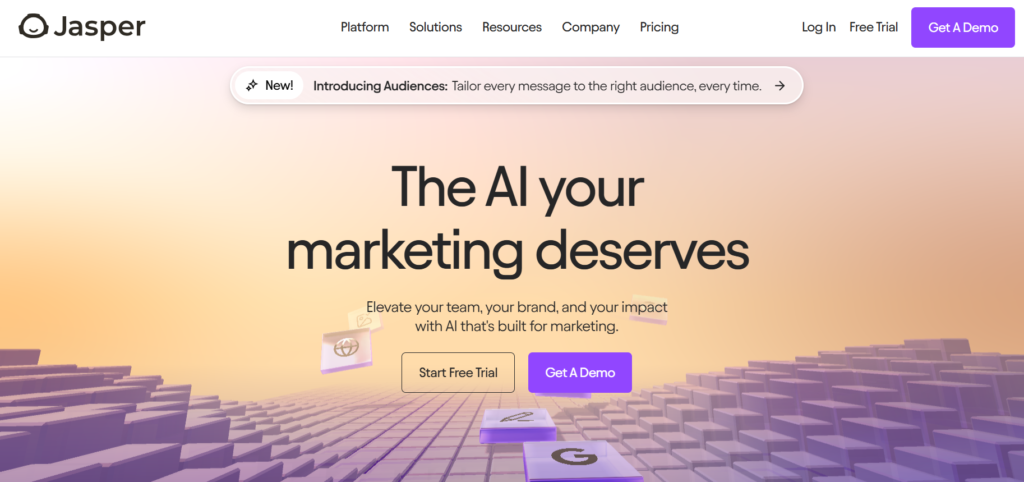
- Pros: Excellent at generating long-form blog content, product descriptions, and ad copy that aligns with your brand voice. It offers tone and style controls to maintain consistency.
- Cons: Outputs often require manual editing or fact-checking to ensure polish and accuracy.
Jasper is a perfect addition for small teams that need to create high volumes of content quickly, especially when paired with SEO and email marketing software tools.
MailerLite
An all-in-one tool designed for small businesses wanting to build and automate email workflows with ease.
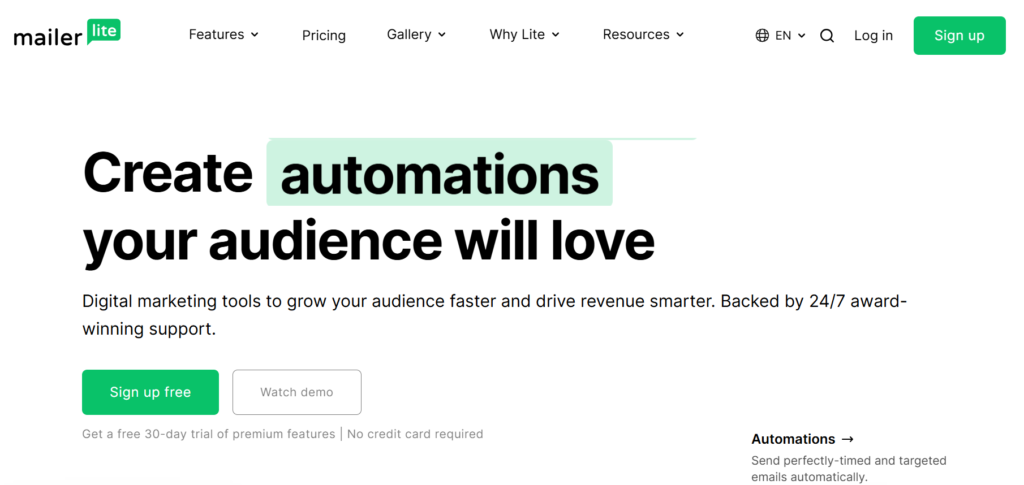
- Pros: Offers a generous free plan, a visual drag-and-drop email builder, and landing page creation all without coding.
- Cons: Integrations are limited compared to other platforms, which may restrict advanced marketing automation flows.
Ideal for early-stage businesses launching email marketing campaigns and lead generation funnels on a budget.
Notion AI
Notion’s AI assistant takes your notes, to-dos, and project outlines and turns them into actionable content and ideas.
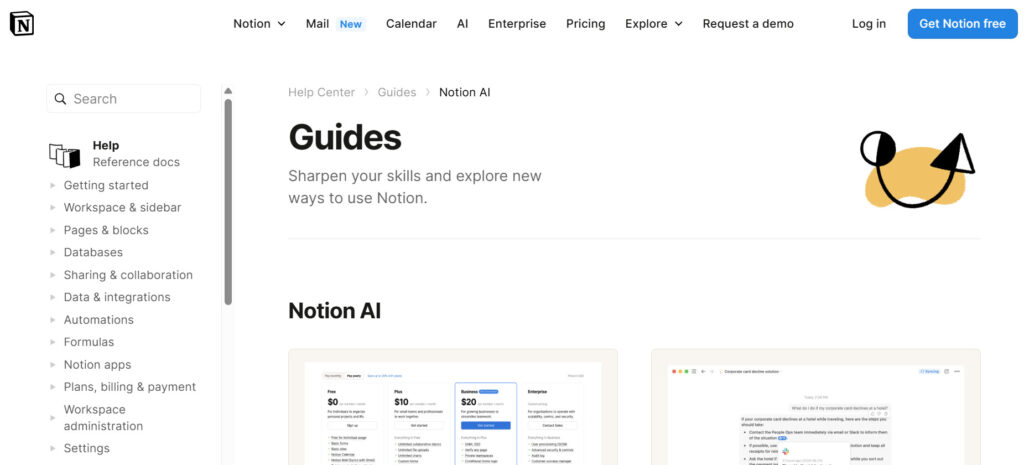
- Pros: Great for planning blog outlines, brainstorming social content, and organizing team documentation.
- Cons: It is not purpose-built for marketing workflows and lacks campaign tracking, customer segmentation, or publishing automation.
It’s best used as a creative planning assistant that complements your other digital marketing tools.
Birdeye AI Suite
More than just automation, Birdeye’s AI Suite transforms how small businesses manage engagement, feedback, and growth.
- Birdeye Surveys AI: Automatically send post-interaction surveys to capture actionable customer feedback.
- Birdeye Reviews AI: Automate review requests and responses, helping you maintain a positive public presence. As of Birdeye State of Online Reviews 2025, 77% of home services now automate their review responses, a shift largely driven by tools like Birdeye that blend AI with real-time responsiveness.
- Birdeye Social AI: Schedule, create, and optimize posts across platforms based on engagement trends.
- Birdeye Messaging AI: Manage all messages from text, webchat, and social media in one intelligent unified inbox.
- Birdeye Insights AI: Monitor customer sentiment, track competitor mentions, and uncover what drives or deters conversion.
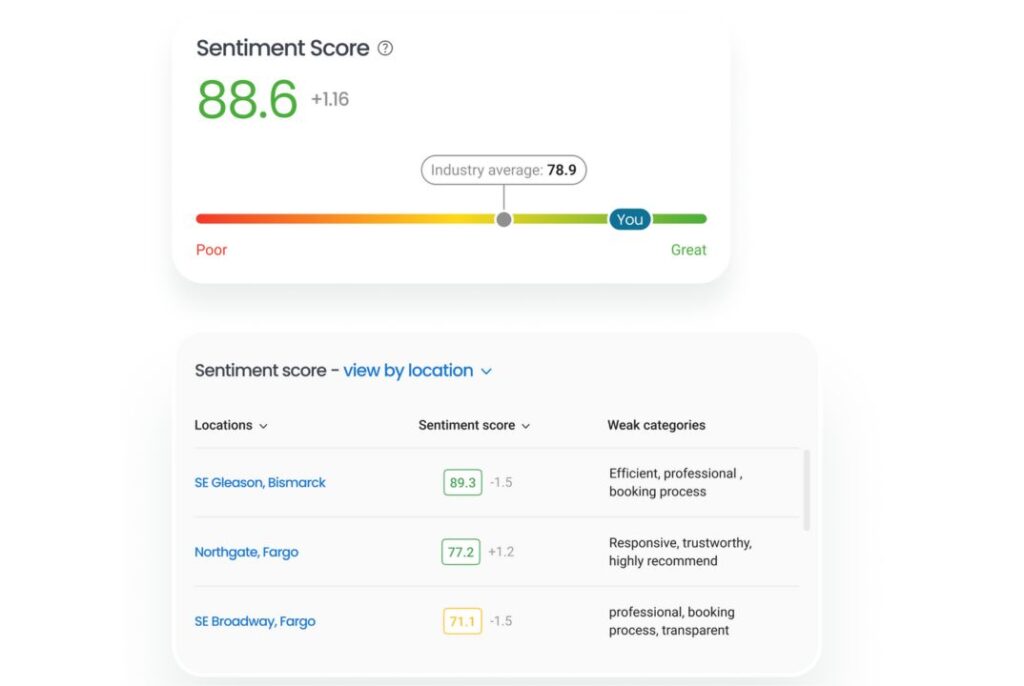
With Birdeye, automation is about:
- Maintaining and enhancing consistency
- Driving smarter decisions
- Improving the customer journey from the first click to the final review
For businesses of all sizes, integrating marketing automation tools like these into your tech stack is the key to scaling without burning out.
2025 milestones that make Birdeye the #1 choice for growing businesses
As per G2 Winter 2025, Birdeye is recognized as a leader in the small business marketing space for a reason:
- Local SEO: Leader (Overall), High Performer (Enterprise), Leader (Canada), Most Recommended (ENT)
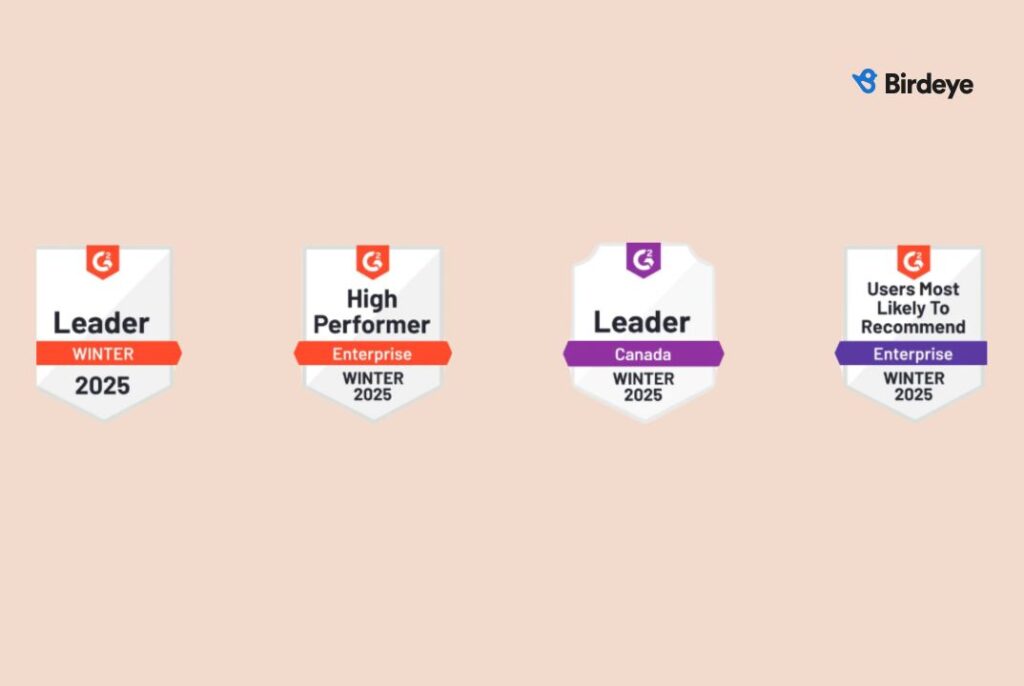
- Social Media Management: Leader (Australia), Best Results (ENT), Easiest Admin (ENT), Easiest to Do Business With (ENT)
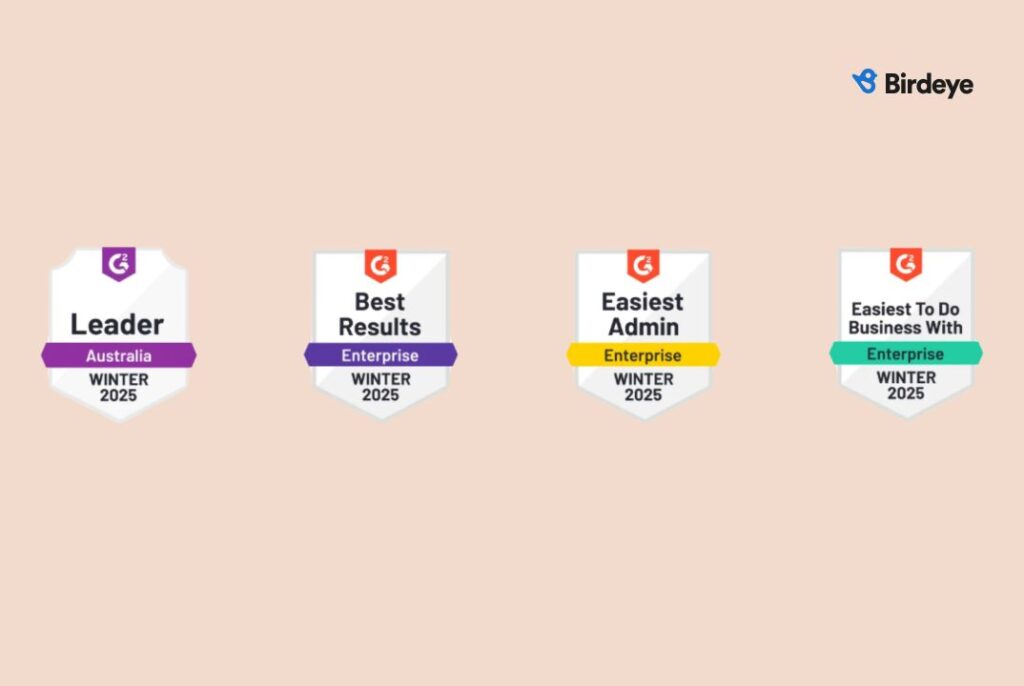
These awards reflect Birdeye’s commitment to delivering real marketing outcomes, not just tools. Whether you’re managing listings, responding to reviews, or building your brand across platforms, Birdeye helps you scale smarter.
How Birdeye helped CF Search Marketing boost visibility

The brand
CF Search Marketing is a full-service agency serving 40+ auto brands across 23 locations.
The challenge
Despite strong internal satisfaction scores, their dealership clients had inconsistent online reviews that didn’t reflect real performance, hurting visibility and trust.
The result
With Birdeye, CF Search integrated review requests into dealership systems, automated feedback collection, and analyzed sentiment patterns. The result?
- One dealership increased reviews by 500% in one month.
- Another improved their rating from 3.7 to 4.0 stars in 4 months.
- A third jumped from 3.0 to 4.8 in just 2 months.
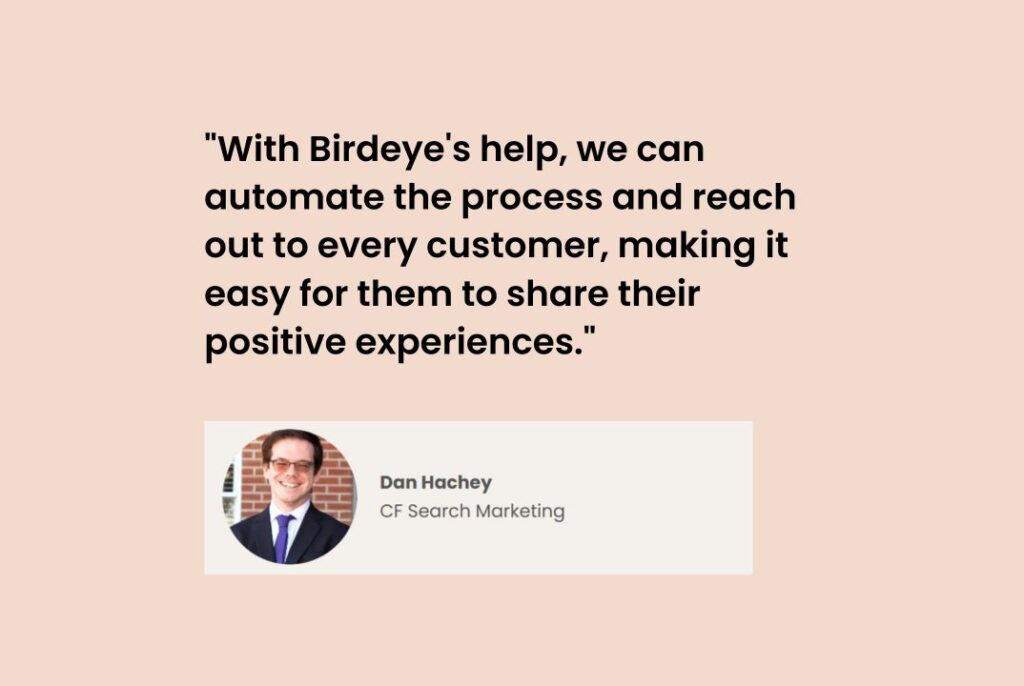
Learn more about Birdeye and CF Search Marketing
How to choose the right digital marketing tools for your small business
With hundreds of tools vying for your attention, selecting the appropriate digital marketing tools for your small business can feel overwhelming. But making the wrong choice doesn’t only waste time; it can stall your growth, create workflow chaos, and leave your team juggling disconnected platforms.
That’s why it’s essential to pause and ask the right questions before investing in any marketing platform. The best tools offer features that fit your business stage, align with your goals, and support your team’s capacity.
Here’s how to evaluate your options with clarity and confidence:
1. Assess your current business stage
Are you just starting your business, scaling up, or managing multiple locations? New businesses often need simple, budget-friendly tools with free features and templates. Growing companies benefit from platforms that offer automation, integrations, and analytics. Established businesses may need enterprise-grade tools with deep customization and team collaboration options.
Your goal: Choose a solution that supports your current needs but won’t hold you back as you grow.
2. Identify your most valuable marketing channels
Not all channels matter equally. For some businesses, email marketing campaigns drive the most conversions. For others, local SEO, Google reviews, or social media engagement are the top sources of leads. Understanding your audience’s behavior is key to selecting tools that amplify what’s already working.
Your goal: Pick platforms that prioritize your highest-impact marketing channels and can adapt as audience behavior shifts.
3. Clarify your budget and growth mindset
Free versions are a great starting point, but they often come with limitations. If you’re serious about scaling, investing in paid plans with advanced tools can save you time and unlock smarter automation. Evaluate the ROI, not just the price.
Your goal: Find tools that offer flexible pricing with value at every tier so you can scale without switching platforms.
4. Evaluate your team’s capacity
Do you have a marketing manager, or are you handling everything solo? Can your team manage five different logins, or do you need one central hub? Even powerful tools can slow down execution if they require too much maintenance or have a steep learning curve.
Your goal: Prioritize platforms with intuitive UX, great customer support, and time-saving integrations.
💡 Protip: Go for all-in-one when possible
GenAI solutions like Birdeye bring together email, reviews, social media, messaging, and analytics tools into a single platform, saving time, reducing costs, and giving you a complete view of your marketing performance.
FAQs about marketing tools for small businesses
Tools like Birdeye, Mailchimp, and ConvertKit top the list thanks to their ease of use, automation features, and integrations for email marketing campaigns.
Solutions like Birdeye Listings AI and Semrush help with SEO, keyword research, and syncing your business details across directories to boost local search performance.
Google Analytics, Birdeye, Mailchimp, Canva, Hootsuite, and Surfer are the most popular tools for different aspects of your small business marketing strategy.
Yes. Tools like MailerLite, Google Analytics, Buffer, and Birdeye’s demo plan offer powerful features at no cost to help small business owners get started.
They save time, reduce manual work, and help deliver consistent customer experiences. Solutions like Birdeye, Jasper, and MailerLite can automate emails, reviews, social media posts, and more.
Final thoughts: Choose marketing tools that work smarter together
The best marketing tools for small businesses act as strategic pillars, working together to strengthen your entire marketing system. A seamless integration across email, reviews, social media, automation, and analytics transforms disconnected tasks into a cohesive, high-performing marketing operation that scales with precision.
Instead of juggling between social media tools, CRMs, and other marketing tools, choose platforms that unify your efforts, boosting productivity for your sales team and delivering a better customer experience. That’s what platforms like Birdeye deliver: one login, one dashboard, and everything you need to build trust, drive visibility, and scale smarter.
Opt for a solution that helps you deliver valuable content, track results in real-time, and support every stage of the customer journey.
With Birdeye’s marketing hub plans starting at affordable tiers, small businesses can access enterprise-grade features without the complexity or cost.
Need a platform that scales with your business? Try Birdeye. Watch a demo now.

Originally published




![[Feature image ] Customer-centric marketing- how to win, retain, and grow your customer base in 2025](https://birdeye.com/blog/wp-content/uploads/Feature-image-Customer-centric-marketing-how-to-win-retain-and-grow-your-customer-base-in-2025-375x195.jpg)




